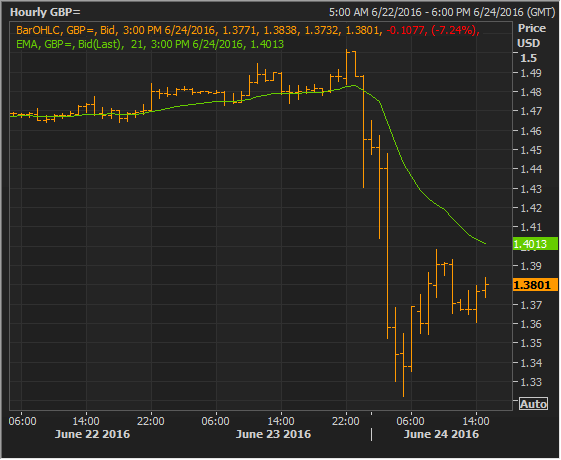Having pretty much nearly priced in a win for the “remain” camp shortly after polls closed in the historic UK referendum on EU membership on Thursday, June 23, the flow of results during the night started to contradict this general view. In volatile trading, the markets had the giant task of reversing their earlier judgement and price in the “leave” victory, which meant a huge sell-off in the pound and falls in the prices of risky assets. The prices of safe havens such as gold, government bonds and the Japanese yen rose.
The uncertainty around the referendum has now been replaced by a number of new questions that will need to be answered quickly in order to limit the damage the uncertainty is causing. The first major question that will need to be answered is what a new UK government will look like following the resignation of David Cameron. Given that Prime Minister Cameron will be reluctant to lead the negotiating team that will agree the terms of the separation between the EU and the UK, it will be difficult to wait for the Conservative Party conference in October for Cameron to step down. At the same time, the EU seems to be pressing for the whole process to speed up and the application to leave the EU to be submitted as soon as possible.
The second source of uncertainty which is even bigger is what the ultimate deal between Britain and the EU will look like. It appears that the UK will not be able to keep its access to the Single Market given the promises of the “leave” camp to curtail the free movement of labor and to stop contributing into the EU budget. Quitting the Single Market will probably have serious negative economic consequences for the UK economy. Of course it is always possible that the new government performs a “U-turn” and opts for an arrangement like Norway’s or Switzerland’s but given the overall tone of the “leave” campaign, it is difficult to speak seriously of such a possibility at this stage.
The third major uncertainty that has opened up is what will happen to Scotland and Northern Ireland. It’s possible that all will be quiet and the referendum result will be eventually accepted but both nations have had political issues in the past as there was a Scottish independence referendum as recently as 2014 and Northern Ireland went through a particularly violent conflict between unionists and nationalists in the 1969-2003 period. It is also worth noting that both Northern Ireland and Scotland voted in favor of “remain”, which might create some tensions with the largely English and Welsh votes in favor of “leave”. This is something to keep in mind – particularly the Scottish issue – as in the recent past it was a similar referendum that caught the market’s attention at the time.
A fourth source of uncertainty might be that EU members other than the UK also decide to break away from the Union. This could increase the uncertainty for the European Union and the Eurozone itself if such members are also euro members. Therefore this is another front that could potentially open up and given the rise of anti-EU populism on the continent, such a possibility should not be easily dismissed.
In conclusion, political uncertainty has been elevated to fresh highs following the win by “leave” and the possibility for fresh crises to emerge has increased substantially. It will be interesting whether investors choose to again pretty much ignore this uncertainty as in the run-up to the UK referendum or whether they become more sensitive to such dangers. Central banks around the world should seek to reassure markets and businesses by employing loose monetary policies and interest rates should be held at low levels and ample liquidity will be provided. The impact of this uncertainty on global economic growth will also be key to watch. Watching for answers to the questions posed above should now preoccupy many investors and analysts.
Forex trading and trading in other leveraged products involves a significant level of risk and is not suitable for all investors.
Recommended Content
Editors’ Picks
EUR/USD clings to gains above 1.0750 after US data

EUR/USD manages to hold in positive territory above 1.0750 despite retreating from the fresh multi-week high it set above 1.0800 earlier in the day. The US Dollar struggles to find demand following the weaker-than-expected NFP data.
GBP/USD declines below 1.2550 following NFP-inspired upsurge

GBP/USD struggles to preserve its bullish momentum and trades below 1.2550 in the American session. Earlier in the day, the disappointing April jobs report from the US triggered a USD selloff and allowed the pair to reach multi-week highs above 1.2600.
Gold struggles to hold above $2,300 despite falling US yields

Gold stays on the back foot below $2,300 in the American session on Friday. The benchmark 10-year US Treasury bond yield stays in negative territory below 4.6% after weak US data but the improving risk mood doesn't allow XAU/USD to gain traction.
Bitcoin Weekly Forecast: Should you buy BTC here? Premium

Bitcoin (BTC) price shows signs of a potential reversal but lacks confirmation, which has divided the investor community into two – those who are buying the dips and those who are expecting a further correction.
Week ahead – BoE and RBA decisions headline a calm week

Bank of England meets on Thursday, unlikely to signal rate cuts. Reserve Bank of Australia could maintain a higher-for-longer stance. Elsewhere, Bank of Japan releases summary of opinions.
